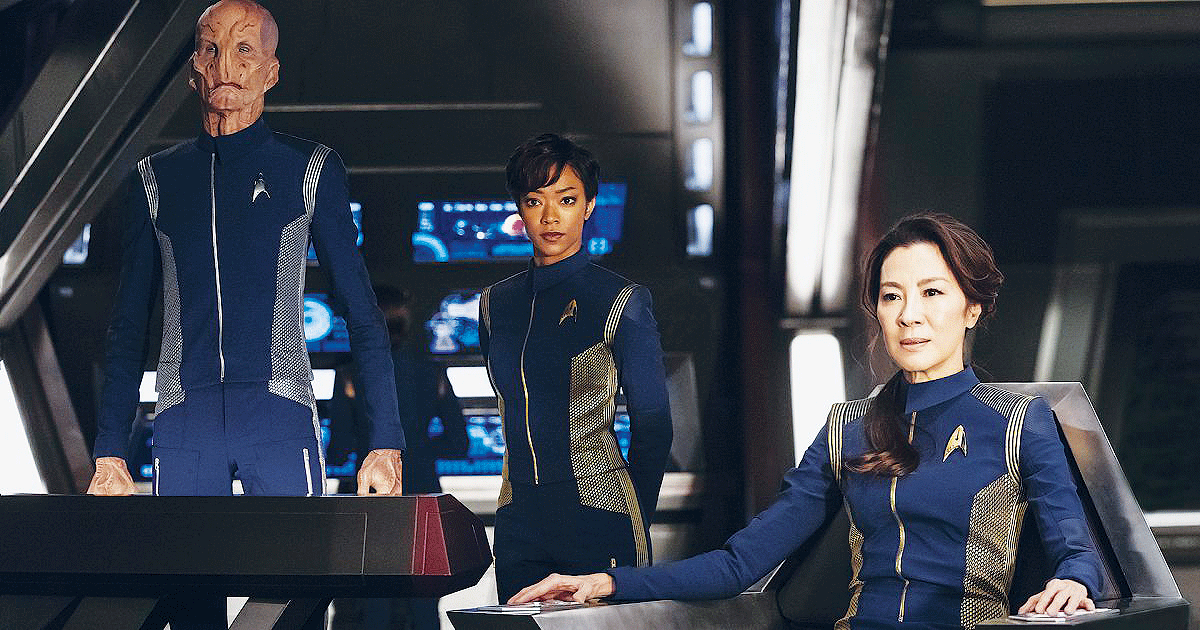 By Jacob Huller
By Jacob Huller
On Sept. 24th the first episode of “Star Trek: Discovery,” the sixth television series to bear the Star Trek name, premiered on CBS. The new series marks Star Trek’s long-awaited return to the airwaves ever since “Star Trek: Enterprise” was canceled in 2005, and comes after months of build-up and controversy amongst the “Trekkies” fanbase.
Discovery’s lead, Michael Burnham (Sonequa Martin-Green), is the first person of color Star Trek lead since Avery Brooks’ Commander/Captain Sisko of “Star Trek: Deep Space Nine” and the first female lead since Kate Mulgrew’s Captain Janeway of “Star Trek: Voyager.” She is also the first Star Trek lead to not have a command at the start of the series, instead being a first officer under Captain Georgiou (Michelle Yeoh) of the USS Shenzhou.
The show begins with the Klingons. T'Kuvma – a self-proclaimed second coming of the Klingon messiah, Kahless – is seeking to unite the Klingon Empire and launch war against the United Federation of Planets, seeing their unity as a threat to their culture. This theme was explored before in the sixth Star Trek film, “The Undiscovered Country,” so it fits well here.
Meanwhile, on the Federation side of the story, we have Burnham, who is a human raised by Vulcans after her family was killed in a Klingon attack. What’s most notable about this backstory is that the Vulcan that raised her is Sarek, the father of Spock from The Original Series, played here by James Frain. This may seem like fan-service at first (one almost wonders when the inevitable “Childhood with Spock” flashback will occur), but it does inform Burnham’s actions in the first episode.
Burnham, after seven years under Georgiou, is said to be ready for her own command. But demons from her past begin to haunt her when she encounters and kills a Klingon in self-defense while investigating an unknown structure. She asserts that the best course of action with Klingons is to fire first, as they would see it as a sign of respect. Taking actions into her own hands, Burnham nerve-pinches Georgiou, assumes command, and is about to fire when she is found out and apprehended.
Her actions mirror Spock’s in The Original Series quite nicely, which is smart considering they likely had similar upbringings. We see Spock’s behavior in “Balance of Terror,” where he agrees that firing first on the Romulans would be respected as a show of strength, and where in “The Menagerie,” Spock risks the death penalty to help out his old Captain. It may seem odd that Spock never mentioned his adopted human sister once, but he never mentioned his father or his half-brother Sybok until he absolutely had to, so it isn’t exactly implausible.
Also influencing Burnham’s actions are her backstory. The Klingon attack when she was a child left her with severe PTSD regarding the subject, and her subsequent prejudice against Klingons arguably starts a war. By the end of “Battle at the Binary Stars,” she ends up sentenced to life imprisonment for her actions. Of course, she’ll eventually get out of this and end up serving aboard the USS Discovery, but has to deal with the guilt of being the cause of a potentially long and bloody conflict, as well as the death of her mentor.
Burnham’s arc promises to be an interesting one to say the least, and her actress portrays her well in terms of emotion as well as occasional wit. The main cast also includes Saru (Doug Jones), a Kelpien science officer, Ash Tyler (Shazad Latif), a former prisoner of war who finds common ground with Burnham, Sylvia Tilly (Mary Wiseman), a cadet who bunks with Burnham on the Discovery, Gabriel Lorca (Jason Isaacs), Captain of the Discovery and Paul Stamets (Anthony Rapp), an “astromycologist” and the first openly gay character in Star Trek’s prime timeline.
Judging firmly on the first two episodes, I deem Discovery to be good. It shows promise, and at least deserves a chance from Star Trek fans and newcomers alike.
Then again, I’m that one Trekkie who unironically likes “Star Trek: Insurrection” and “Nemesis,” and thinks seasons one and two of Enterprise are genuinely good, so who am I to judge?


